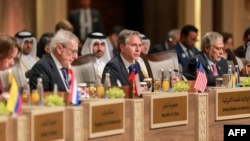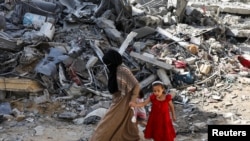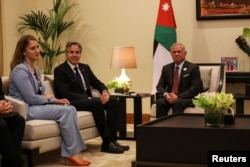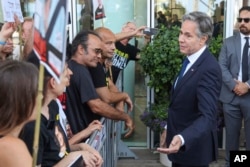Hamas has responded to the U.S.-backed proposal for a cease-fire in Gaza through the Qatari and Egyptian mediators. Qatar and Egypt are looking over the response and have confirmed they will continue mediation with the United States. The U.S. says it is evaluating the Hamas response.
According to Hamas and the smaller Islamic Jihad militant group, they are ready to "deal positively to arrive at an agreement," prioritizing a "complete stop" to the war.
Both Israel and Hamas have asked that the plan support their discordant goals, which poses questions about the ability for the deal to be finalized.
"The Hamas response reaffirmed the group's stance any agreement must end the Zionist aggression on our people, get the Israeli forces out, reconstruct Gaza and achieve a serious prisoners swap deal," a Hamas official said.
Meanwhile, U.S. Secretary of State Antony Blinken is in the Middle East for talks involving a cease-fire and post-war plans in Gaza.
In those discussions, the United States says it is providing additional humanitarian assistance to Palestinian civilians in Gaza and the surrounding region in response to dire humanitarian conditions.
“Today, I'm announcing an additional $404 million in new aid to Palestinians, in addition to the more than $1.8 billion in development, economic and humanitarian aid that the United States has provided Since 2021,” U.S. Secretary of State Antony Blinken announced on Tuesday at a humanitarian assistance conference hosted by Jordan.
He also urged other donors to increase their contributions.
Humanitarian aid
According to international rights groups and U.S. officials, more than a million people have been displaced from Gaza’s southern city of Rafah in the last month alone and many of those have been uprooted multiple times. Ninety-five percent of the population there cannot access clean drinking water. Most of Gaza's sanitation system has been destroyed, and fewer than a dozen of its 40 hospitals remain open.
The new U.S. funding will provide essential support to vulnerable Palestinians in Gaza, the West Bank, and the surrounding region. This includes food, safe drinking water, health care, protection, education, shelter, and psychosocial support.
Jordan’s King Abdullah said Tuesday that providing humanitarian aid for the Palestinians in Gaza is “a test of our humanity and sincerity” as Jordan, Egypt and the United Nations convened a conference on improving the flow of aid.
“We cannot abandon Gaza,” he told the conference. “It should be everyone’s priority, because history will judge us by our actions.”
King Abdullah discussed with Blinken in a separate meeting on Tuesday the comprehensive cease-fire and hostage release deal that the State Department said "offers a concrete roadmap for ending the war in Gaza."
U.N. Secretary-General Antonio Guterres said all available routes for bringing humanitarian aid into Gaza “must be operational,” and he stressed that land routes “are absolutely crucial.”
“More than 1 million Palestinians in Gaza do not have enough clean drinking water and face desperate levels of hunger,” Guterres said.
The U.N. chief said the speed and scale of the carnage and killing in Gaza are beyond anything he has seen in his years as secretary-general.
“The horror must stop. It’s high time for a cease-fire along with the unconditional release of hostages,” Guterres said.
Cease-fire deal
Earlier on Tuesday, Blinken said that Israeli Prime Minister Benjamin Netanyahu has reaffirmed his commitment to a proposed multistage cease-fire in Gaza. At the time, Hamas had not presented a response.
"Everyone's vote is in, except for one vote, and that's Hamas'," Blinken had told reporters in Tel Aviv before Hamas's response. "It is on Hamas to move forward with this proposal or not."
Blinken said the U.N. Security Council’s approval of a U.S.-drafted resolution calling on Israel and Hamas to implement the cease-fire deal “made it as clear as it possibly could be that this is what the world is looking for.”
After the 14-0 vote Monday, with Russia abstaining, Hamas issued a statement welcoming that the council has "affirmed a permanent cease-fire in Gaza" and indicating a willingness to engage in indirect negotiations over implementing the principles "that are consistent with the demands of our people and resistance."
Blinken spoke after a meeting with Israeli politician Benny Gantz, who left Netanyahu's emergency government Sunday while saying Netanyahu is mismanaging the war. Both Gantz and opposition leader Yair Lapid stressed the need to secure a deal, in comments posted on X after their talks with Blinken.
Meanwhile, Blinken welcomed reform announcements by the Palestinian Authority in a meeting with Palestinian Prime Minister Mohammad Mustafa in Jordan on Tuesday.
Blinken “reaffirmed the United States’ support for the establishment of an independent Palestinian state with security guarantees for Israel," said the State Department.
The top U.S. diplomat also met briefly with family members of some of the hostages held in Gaza.
Blinken said the United States is determined to bring home the hostages, and that the proposed cease-fire is “the best way to do that.”
In its initial phase, the three-phase cease-fire proposal calls for a halt in fighting, the release of some hostages from Gaza, the release of some Palestinian prisoners held by Israel, a surge in humanitarian aid for Palestinians, the withdrawal of Israeli troops from populated areas of Gaza, and the return of Palestinian civilians to their homes and neighborhoods.
The second phase envisions a permanent cessation of hostilities in exchange for the release of all other hostages in Gaza and a full withdrawal of Israeli troops from Gaza.
The final phase includes a multi-year reconstruction plan for the Gaza Strip, much of which has been devastated by eight months of Israeli bombardment. It would also provide for the return of the remains of any deceased hostages still in Gaza.
The October 7 Hamas terror attack resulted in the deaths of about 1,200 people in Israel, mostly civilians, according to official Israeli figures. Hamas militants took about 250 hostages, 116 of whom remain in the Palestinian territory, including 41 the army says are dead.
Israel's military response has killed more than 37,000 Palestinians, according to Gaza's health ministry, which does not distinguish between fighters and civilians in its figures.
State Department Bureau Chief Nike Ching contributed to the report. Some information for this report was provided by The Associated Press, Reuters and Agence France-Presse.











